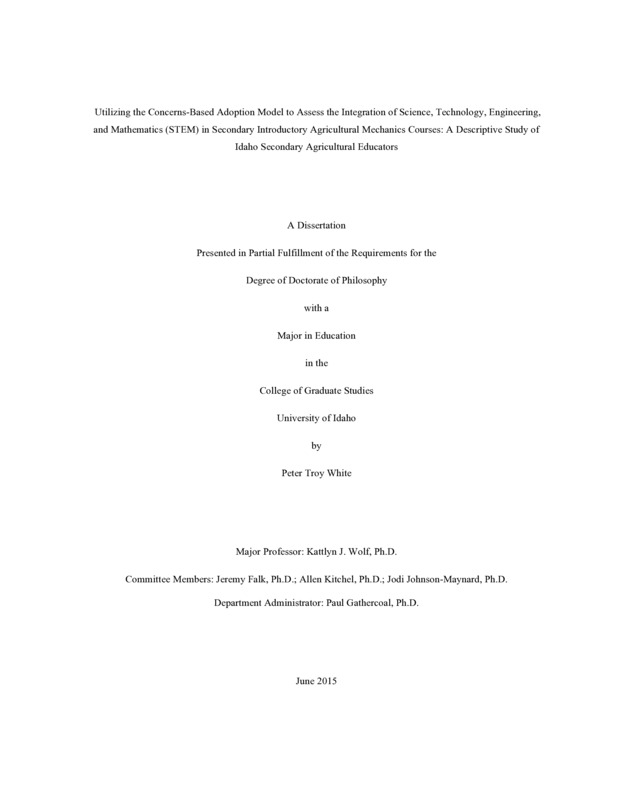Utilizing the Concerns-Based Adoption Model to Assess the Integration of Science, Technology, Engineering, and Mathematics (STEM) in Secondary Introductory Agricultural Mechanics Courses: A Descriptive Study of Idaho Secondary Agricultural Educators
White, Peter Troy. (2015). Utilizing the Concerns-Based Adoption Model to Assess the Integration of Science, Technology, Engineering, and Mathematics (STEM) in Secondary Introductory Agricultural Mechanics Courses: A Descriptive Study of Idaho Secondary Agricultural Educators. Theses and Dissertations Collection, University of Idaho Library Digital Collections. https://www.lib.uidaho.edu/digital/etd/items/white_idaho_0089e_10631.html
- Title:
- Utilizing the Concerns-Based Adoption Model to Assess the Integration of Science, Technology, Engineering, and Mathematics (STEM) in Secondary Introductory Agricultural Mechanics Courses: A Descriptive Study of Idaho Secondary Agricultural Educators
- Author:
- White, Peter Troy
- Date:
- 2015
- Embargo Remove Date:
- 2017-07-16
- Keywords:
- Agriculture Education Mechanics Stages of Concern STEM
- Program:
- Curriculum & Instruction
- Subject Category:
- Agriculture education; Education; Science education
- Abstract:
-
Science, technology, engineering, and mathematics (STEM) careers experienced a growing deficit in the number of qualified replacements for an aging population of workers. Introductory Agricultural Mechanics (IAM) courses as part of Secondary Agricultural Education Programs provide foundational skills students build upon throughout their agricultural mechanics careers. The purpose of this study was to utilize the Concerns-Based Adoption Model to describe the integration of STEM into the Idaho IAM curriculum, including the units of instruction taught in those courses and teachers’ concerns relating to STEM integration into their IAM courses. Utilizing a survey of Idaho Agricultural Science and Technology Instructors, 19 units of instruction were identified as the core of IAM courses in Idaho. Teachers’ Stages of Concern relating to the integration of STEM into IAM courses revealed teachers were interested non-users who may have competing ideas relating to the integration of STEM. Comparisons on demographic variables of years of experience teaching IAM courses, gender, certification pathway, and holding an additional science certification yielded few differences in teachers’ importance ratings or time spent teaching the units, indicating Idaho teachers hold similar views relating to IAM and STEM integration. Stages of Concern Profiles for Idaho Agricultural Science and Technology Teachers with six to 10 years of experience teaching IAM and female teachers suggest they are less likely to have competing ideas in relation to integrating STEM into IAM courses than other groups. Targeted in-service activities focusing on these two groups may lead to faster integration of STEM. Recommendations include creating a cooperatively defined vision for what a STEM-integrated IAM course looks like utilizing Innovation Configuration Maps and active monitoring of the utilization of STEM integration based on the developed Innovation Configuration Maps. Clinical assessments of the methods teachers utilize to improve student learning utilizing active learning and STEM best practices are needed to improve IAM courses. Modification of IAM laboratory teaching strategies utilizing teachers as researchers was recommended. National replication of this study could improve the infusion of STEM principles in IAM courses.
- Description:
- doctoral, Ph.D., Curriculum & Instruction -- University of Idaho - College of Graduate Studies, 2015
- Major Professor:
- Wolf, Kattlyn J
- Committee:
- Falk, Jeremy; Johnson-Maynard, Jodi; Kitchel, Allen
- Defense Date:
- 2015
- Identifier:
- White_idaho_0089E_10631
- Type:
- Text
- Format Original:
- Format:
- application/pdf
- Rights:
- In Copyright - Educational Use Permitted. For more information, please contact University of Idaho Library Special Collections and Archives Department at libspec@uidaho.edu.
- Standardized Rights:
- http://rightsstatements.org/vocab/InC-EDU/1.0/

